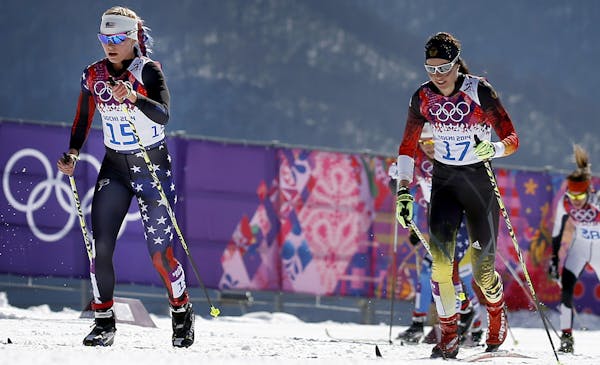SOCHI, RUSSIA – No current member of Team USA men's hockey team was alive when a bunch of rink-rat youngsters wearing the red, white and blue pulled off the mother of all miracles 34 years ago.
Team USA assistant captain Ryan Suter grew up in a house with the gold medal that recognized that remarkable achievement in the Lake Placid Olympics, but even he didn't see or hear it about that often because his father, Bob, isn't keen on braggadocio.
"My dad didn't talk about it much growing up," Ryan said. "I heard more through my friends and teachers telling where they were when that happened. My dad is a pretty quiet guy and doesn't say too much about it, but it was maybe the greatest U.S. sport team ever."
The international hockey landscape has changed dramatically since that scrappy bunch of American amateurs, which included Bob Suter, stunned the Soviet machine in one of the greatest upsets in Olympic and sports history.
Reminders of that 1980 Miracle on Ice still cast long shadows here as Team USA prepares to play Russia in the second game of the Olympic tournament Saturday. Mark Adams of the International Olympic Committee was asked this week about the importance of hockey to the Games. He quoted from a speech given by Dmitry Chernyshenko, president of the Sochi Olympics Organizing Committee.
"He said as a child there were three horror films he knew from the West," Adams sad. "One was 'Nightmare on Elm Street,' the second one was 'Friday the 13th,' and the third one was Miracle on Ice."
That last flick probably plays on an endless in loop inside Vladislav Tretiak's mind. Tretiak carries deep ties to the past and present of Russian hockey. He won three golds for the Soviet Union and is considered one of the greatest goalies in hockey history. He's so revered within his country that he was chosen to light the cauldron during the Opening Ceremony.
He also carries the burden of 1980, the star goalie benched after the first period after allowing two goals. Now the president of the Russian Hockey Federation, Tretiak was asked how long it took for him to get over that loss. His response revealed a glimpse of both his pride and humility.
"Let me tell you this: In '84, we managed to rectify our mistakes," he said, referring to the Soviets' gold medal at the Sarajevo Games. "In 1980, it was a miracle and in fact it made it possible for ice hockey to develop so fast in the United States and gave it great impetus.
"In 1980, it was a good lesson that the Americans taught us," he continued. "You have to respect your competitors and only after the game can you tell what you think about them. We did not have respect for the competitors at that time, but we won't have that happen during this Olympics."
Those old Soviet teams commanded respect during their Olympic supremacy. They were mighty and feared, winners of six gold medals between 1964 and 1988.
Their run of dominance has disappeared, though, in part because the NHL began sending players to this event in 1998. This a different time in Olympic hockey, with Canada the clear favorite and Team USA looking to build upon its silver medal performance four years ago. Since the collapse of the Soviet Union, the U.S. has played Russia four times, going 1-2-1.
Russia has wobbled in the previous five Olympics, collecting only one silver medal, one bronze, and one national embarrassment in a sixth-place finish in Vancouver.
"It was a big blow to us, a big failure, a big blow to everyone in Russia," said Alex Ovechkin, the face of Russian hockey.
The Russians, Ovechkin in particular, entered this tournament saddled with enormous pressure to medal on home soil. They carry the hopes of an entire country onto the ice with them. Another flop will leave a permanent stain on their legacy.
"For Russia, hockey is game No. 1 and sport No. 1 and of course people want to see victory, finally," former Soviet great Slava Fetisov told the Olympic News Service. "Can you imagine what it would have been like had Canada not won in Vancouver? If Russia loses, will everyone be sent to Siberia? Probably not. Of course, the players understand the importance of the game."
If they lose to Team USA on Saturday, Siberia might seem like paradise compared with the reception they will receive at home. A victory by the U.S. won't qualify as a miracle this time, but the Russians don't want to go down that path again.
Chip Scoggins • chip.scoggins@startribune.com

Scoggins: Finch feeling heat of the Suns as playoff battle looms
Scoggins: Why 'championship or bust' fits these Wolves

Scoggins: Anatomy of a game-saving play as Correa throws out Ohtani


